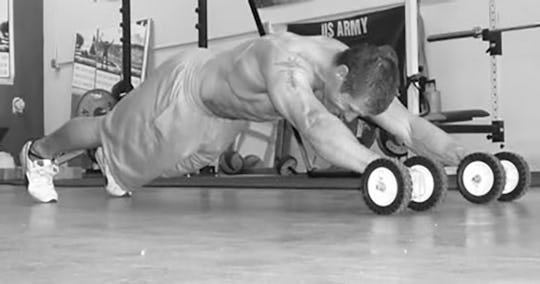Over the last few years, there’s been a steady rise in popularity within unconventional, “Hardcore” style functional training, and for good reason, it works!
This kind of training has often been called “Caveman Training” due to its simplistic approach to training through methods and techniques that are mainly real-world based. There’s no fancy machines used, no gimmicks or special tricks, just down and dirty hard work. Personally, I like to call this type of training “Caveman Training.”
From what I’ve seen, there are many different types of Caveman Training out there, most of which are based on the same principles I talked about above, but the main focus of Caveman Training for me is that it’s very primal in nature. With that being said, let’s look at what primal, Caveman Training means through my eyes.
In my view, Caveman Training is first and foremost about training both your mind and body, forging a connection between the two. Second, everything you do needs to be functional and real-world based, so the means to which we train will always revolve around using our own bodyweight or some sort of external odd objects such as rocks, sandbags, or other strength building tools.
If you imagine the days of our caveman ancestors, I think immediately about what they must have had to do on a daily basis in order to survive: hunting, gathering food, and surviving attacks from predators.
To re-create these types of events in the weight room would involve doing short, all-out bouts of power and strength sets (symbolizing going after the kill during a hunt or the attack from a predator). Then, after the kill or the attack, cavemen might have had to either pursue a wounded animal or possibly flee after an attack from a predator.
Thinking about what we had to be prepared for back then is fun. This is what makes Caveman Training that much more interesting and “real.” While we can’t fully recreate these types
Caveman Strength Workout Session Set Up
For Caveman Training sessions, my main focus will be on short, high intensity, all-out bursts of power and strength mixed in with a combination of pre and post workout bouts of cardio. The ways I approach this type of training is through primal, bodyweight based movements (sprinting, animal movements, jumps, climbs, etc.) blended with full body, explosive power lifts like clean & presses, thrusters, and shouldering. I definitely want to add in some heavy strength-based lifting as well heavy squats, deadlifts, and overhead presses to help keep strength and focus.
All of my strength lifts use odd objects to help create the real world strength needed by cavemen. That means that my main strength tools of choice will definitely be sandbags, stones, and sleds (either a real dragging sled or tire). After the initial use of the power and strength based movements, I either allow a full resting period for recovery, or throw in a bout of light cardio (jogging or short to medium distance sprints) or weighted cardio (sled pushes, drags, carries, weighted runs with sandbags, a weight vest, med balls, rocks, and ruck marches) to symbolize the chase after a hunt, the flee from an attack, or the gathering and return of food from a hunt.
Caveman AMRAP Interval Workout
I mentioned that I may use weighted cardio BEFORE the strength and power focused work to symbolize and recreate how much a caveman might have had to travel to get to where he needed to be before he actually engaged in hunting or had to fight. This adds to the “be prepared for anything” type of mindset. For example, if you were hunting back then, you may have had to travel for a few miles before you even got the chance to hunt and kill.
The important thing to think about here is this: would you still be able to engage in short power and strength focused work (like the kind you would need to survive a dangerous situation) if you were tired and pre fatigued? A great way to recreate this is by either performing a 1-2 mile run or even a longer ruck style march BEFORE you do any actual heavy strength or power based work. It will help prepare and teach your body to perform when you’re a bit pre-fatigued. I designed the Caveman Training Workouts within this article to be short and intense. I did this through the use of short 2-10 minute AMRAP circuits.
The AMRAP interval set up is a great way to blend in different modalities of training and has also proven to be a highly effective to help increase strength, power, and conditioning (all the essential traits you would need to survive as a caveman).If you don’t know what an AMRAP circuit is, it is a density-style circuit that means “As Many Rounds As Possible.”For example, if you had a 3 minute AMRAP circuit incorporating 3 different movements, you would perform that circuit as many times through as you could within 3 minutes without stopping. The only time you would rest is when you absolutely had to. Bottom Line, this type of training is designed to be very tough and challenging on both the mind and body, great for building up your inner caveman.
Using Caveman Workouts
If we were to look at the overall scope of things, back in caveman days, man had to be prepared for anything and everything, so training for the unknown is essential. This is important to note because in this sense Caveman Training Workouts will be a little bit more randomized. Depending on what your goal is, using Caveman Training sessions within your training will differ.
If you’re goal is more for strength, I would only use Caveman Training sessions either 1-2 times a week blended in with a consistent strength-focused program that follows more of a set schedule. If your goal is to simply go totally primal, then you could be sporadic with your training and do something totally random and different every session.
It’s important to note that one of the biggest mistakes a person can make when designing their training program is to be inconsistent with their overall goal. If you’re trying to get stronger, you’ll want to be a bit more progressive and consistent with your programming versus if you’re just training to train. Since Caveman Training will be a bit more random, it wouldn’t be the best to do it everyday.
One important thing to note about programming is to always try and keep things balanced in order to avoid overtraining and injury. A common mistake that many people make is that they train way too much, never take planned rest days, and they train in such a way that isn’t balanced.
Sample Caveman Workout Week
The following Caveman Training Workouts are laid out in such a way that each focuses on a different strength movement for each session (deadlift focused, squat focused, push, pull, etc). This will help balance out your training instead of focusing on the same movements all of the time. Just make sure that you’re balancing out your push and pull based movements so you’re balanced.
Example Strength Focused Workout Week.
- Monday – Strength Focused Workout – Deadlifts & Overhead Presses
- Tuesday – Off or HIIT Focused Cardio
- Wednesday – Caveman Training Session
- Thursday – Off or HIIT Focused Cardio
- Friday – Strength Focused Workout – Squats & Heavy Pulling or Rowing
- Saturday – Caveman Training Session
- Sunday – Off or HIIT Focused Cardio
NOTES: Strength Focused Workouts will focus more on conventional types of training using barbells and dumbbells and be progressive in nature and consistent. HIIT Focused Cardio would be made up of 20-30 min sprint/ high intense cardio sessions – these would be kept short and sweet
- Monday –Caveman Training Session (Deadlifts for strength)
- Tuesday – Off or HIIT Focused Cardio
- Wednesday – Caveman Training Session (Heavy Press & Pull for strength)
- Thursday – Off or HIIT Focused Cardio
- Friday – Caveman Training Session (Heavy Squat Focused)
- Saturday – Caveman Training Session (Bodyweight only)
- Sunday – Off or HIIT Focused Cardio
Sample Caveman Workouts
Deadlift Focused Caveman Workout
Press Focused Caveman Workout
Squat Focused Caveman Woekout
Bodyweight Focus Caveman Workout
Final Thoughts on Caveman Training
So, there’s my take on Caveman Training and how you can implement it into your own training to help improve strength, power, and conditioning. What’s important to note is that in addition to all of the great increases in performance you’ll receive through training like a Caveman, your physique will rapidly change as well, but only as long as you EAT right.
With that being said, I will leave you with this: if you want to build up some serious muscle and get lean all at once, not only will you want to TRAIN like a caveman, but you’ll also want to EAT like a caveman. With this, I would highly recommend you look into a Paleo like eating plan.



)





